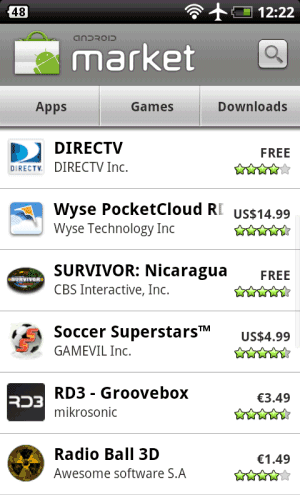Here's an image from Android's original SDK emulator:

Why did Google acquire Andy Rubin's company and invested in Android? One of the reasons was to make a better platform for developing mobile apps. Google already had a few mobile apps for feature phones, Symbian, Blackberry and it was very difficult to add new features and to test the applications because of the inconsistent APIs and their implementations. Android seemed like an interesting opportunity, but Google never anticipated that it will take over the world. It's obvious that Android became the dominant mobile OS because so many companies invested in Android, hoping to come up with better phones than Apple's iPhone.
While Android was open source, Google created a few proprietary apps that weren't part of the Android Open Source Project (AOSP). The most important proprietary Google app was Android Market, which is now called Google Play Store, but Google developed other apps as well: Gmail, Google Search, Google Maps etc. Over time, many open source apps were replaced by proprietary Google apps: the music player became Google Play Music, the calendar app became Google Calendar, the browser became Chrome etc.

Android Market/Google Play is Google's own service and it was licensed to phone manufactures subject to confidential terms and conditions. According to the distribution agreements (MADA) revealed by companies like HTC and Motorola, Android Market was bundled with other Google apps and services, including Google Search and Network Location Provider, which had to be the default search and location services. "Devices may only be distributed if all Google Applications [listed elsewhere in the agreement] ... are pre-installed on the Device," mentions one of the distribution agreements.
The list of bundled Google apps increased over the years, as Google released more and more apps. Phone manufacturers were allowed to bundle competing apps from third-party companies and you'll find many phones that include Whatsapp and Hangouts, Microsoft OneDrive/Dropbox and Google Drive, Facebook and Google+. Here's a screenshot from Samsung Note 4, courtesy of Gsmarena, which shows that Samsung preinstalled Facebook and Google+, Hangouts, WhatsApp and Facebook Messenger, Instagram and Google Photos.

While many Android users complain that their phones have too much bloatware, some companies aren't happy that Google ties the Google Play Store with other Google apps and some default settings (Google = default search engine, Google Network Location Provider = default location provider).
Deutsche Telekom will file an anti-trust charge against Google, complaining that "Google uses its Android mobile operating system to unfairly promote its own products like Google Maps and online search over those of rivals". According to New York Times, "a number of large tech companies, including Oracle and Nokia, as well as small start-ups like Aptoide, a Portuguese online marketplace for smartphone applications, already have filed complaints to European officials connected to the Android investigation." The European Commission has opened a formal investigation into Google's mobile operating system and the Federal Trade Commission started a similar investigation last month.
Is it fair for Google to bundle the Play Store with other apps and to dictate its own terms and conditions? It's obvious that the Play Store is the most important Android app and few people outside of China would buy an Android device that can't access the Play Store. By now, Google Play Store and the associated Google Play Services are hard to separate from Android, even if they're not technically part of Android. This is Google's play: it's holding the keys to more than 1 million apps and dictates its own terms to phone manufacturers. Many of Google's apps are actually useful and they are hard to beat by competitors (Google Maps, Google Search, Gmail, YouTube), but some of the apps aren't the best in their category and Google uses distribution agreements to promote them (Hangouts, Keep, Play Books).
Back in 2008, Android Market was just another Android app store, but now it's the most important by far and it also comes with APIs that tie Android apps to the Google Play Store. I think it's not fair to tie Play Store licensing with bundling other Google apps and Google should use separate distribution agreements for them, just like Facebook and Microsoft.

In some ways, I see how some of the preinstalled Google apps can be excessive. On the other hand, I think having some of them preinstalled on every Android device with the Play Store is good for users because they know what to expect when they get a new phone. I think apps tied to the play store "Play Books, Play Music, etc." should be preinstalled so that users buying those items from the Play Store don't have to install a new app before enjoying/downloading the content. Other apps also make sense. Chrome as the default browser is good for consistency and security. The original "browser" only got updated when the OS was updated which happens maybe once if ever for the majority of Android devices. There are a few other Google apps that make the Google experience worthwhile for Android owners which would be frustrating to have to install, but maybe a separate agreement could be made for these apps. Maybe these are optional during the setup process and removable by users.
ReplyDelete>I think having some of them preinstalled on every Android device with the Play Store is good for users because they know what to expect when they get a new phone.
DeleteOh Please! don't start this. An empty phone is the best phone!
I don't mind having Android bundled with Google's applications, as long as they're not as many. A browser. A mail client. Maps. Everything else should be optional.
ReplyDeleteOn the other hand, device manufacturers should concentrate on building good devices, that's all! Not trying to develop alternative software while they're clearly not good at it (Sammy, anyone?).
No one wants bloatware. By the way, every application should be uninstallable.
I don't mind having Android bundled with Google's applications, as long as they're not as many. A browser. A mail client. Maps. Everything else should be optional.
ReplyDeleteOn the other hand, device manufacturers should concentrate on building good devices, that's all! Not trying to develop alternative software while they're clearly not good at it (Sammy, anyone?).
No one wants bloatware. By the way, every application should be uninstallable.
If manufactures don't want to be tied to Google's terms and services. Make your own. Amazon has their own app store. Make a deal with them.
ReplyDeleteYou think it's "not fair?" what does "fair" mean? is it fair that google bought android and then did years of work, probably does > 90% of the development of AOSP, fought lawsuits about the JVM with oracle...and then gives it away for free? doesn't sound like it's "fair"...but it is. they made the choice to do it and it helps them. now the recipients of all that work can make a choice to buy into the Play Store ecosystem (with the google apps that go along with it), or try to go it on their own like Amazon. Sounds super fair to me.
ReplyDeleteHow is this unfair? Windows comes preinstalled with a bunch of Windows applications: so do OS X, iOS, Windows Phone, etc. Why should Android be different?
ReplyDeleteAre users allowed to uninstall the preinstalled apps?
ReplyDelete(sorry, not an Android user... yet)
No they aren't. Which can get frustrating when for example on a Samsung device you have Google's apps and Samsung's counterparts for those installed as well. So twice as many apps that take up space and sometimes ram.
DeleteNo they aren't. Which can get frustrating when for example on a Samsung device you have Google's apps and Samsung's counterparts for those installed as well. So twice as many apps that take up space and sometimes ram.
DeleteAh, that explains a lot.
DeleteHowever, pre-installed apps can be "disabled" easily - which means that they no longer show up in the app menu, and don't get updated. From the user's perspective, that seems pretty similar to uninstalling the app, except that they still take up a small amount of storage space on the device.
DeleteSomething I've never thought of. Thanks for taking up this issue Alex Chitu. I now see what Android was actually, what it should've been now and what it is really. I really want Google to go away from Android! Let Android be the Android what it should've been. Let us choose things by ourselves. Google just sat on alone on this open source project.
ReplyDeleteIf manufactures don't want to be tied to Google's terms and services. Make your own. Amazon has their own app store.
ReplyDeleteThanks for sharing This valuable information.It is always beneficial to get yourself or your core teams trained with development process
ReplyDeleteand also get acquainted with the app development protocols(ios training in chennai) and terms that will
eventually enable you to run your organization or business in a smooth and a profitable manner, although you may not give a serious thought to it.
Regards,
Best ios training Academy in Chennai
Wow, that screenshot of the old Android Market took me straight back to my HTC Desire from 2010. It's amazing how quickly things have moved since then.
ReplyDeleteGive Easy Call to Gmail tech support number and overcome many of the hardships instantly. Chat with the Gmail support team and handle severe most complications at the affordable price.
ReplyDeleteAwesome post.
ReplyDeleteAndroid Training in Chennai | Best Android Training Institute in Chennai
Awesome post.
ReplyDeleteAndroid Training in Chennai | Best Android Training Institute in Chennai